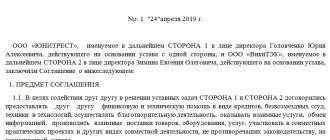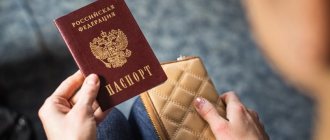Very often, individual entrepreneurs use personal property when running their business. There are no prohibitions in this matter, and there are no special boundaries separating the personal property of an individual from his other assets as an individual entrepreneur. Questions begin to arise when an individual entrepreneur decides to sell his property, and the main one of these questions remains the following: what tax on income received from the sale of property should the individual entrepreneur pay to the state budget?
What property does an individual entrepreneur have the right to use in his activities?
The property of an entrepreneur is difficult to divide into personal (family) and business (work).
For example, a businessman drives the same car to take his child to kindergarten or to the doctor, while still having time for business meetings. Or, for example, the designer’s work laptop is used by the whole family for games and social networks. But this does not mean that no criteria for grouping exist. To divide assets, clearly define how and in what way a particular item is used in the business. Is it beneficial? And most importantly, are these facts documented?
Any property of a merchant is permitted to be used in business. But it is not always possible to take into account the costs of purchasing and maintaining personal property. It will be necessary to prove that this property is beneficial for business activities.
Let's say the same example with a car. This is the property of an individual entrepreneur used in business activities. Expenses for maintenance and operation are confirmed by waybills, receipts from gas stations, and maintenance contracts. That is, the businessman has documented that the machine “works” in business. Then the inspectors will not have any questions.
Content
- Personal property for sale
- Entrepreneur's property for sale
- When the IP is closed
This question is quite complex, so here it is necessary to take into account the use of the property in business, and its features, and the period of ownership, and the type of activity of the individual entrepreneur, and the possibility of applying deductions. It is believed that it is more profitable to sell any property as an individual than as an individual entrepreneur. But the seller will have to confirm his status as an ordinary citizen, and not a businessman. There may be several situations, we will consider the main points.
How to put the property into operation
Under a simplified taxation regime (income minus expenses), the taxpayer has the right to take into account expenses incurred when calculating the tax amount. The more business costs, the lower the amount to be paid to the budget. Businessmen try to take into account almost all purchases and expenses: even those that are not at all related to their activities.
The initial problem in using personal property of an individual entrepreneur in business is documenting and confirming business benefits. What does it mean? Let's look at two examples.
Example No. 1.
A self-employed designer bought himself a new computer. The merchant took into account the costs of purchasing, setting up and software when calculating the simplified tax system of 15%. In fact, the Federal Tax Service will not have any questions. The computer and software are directly used to develop design projects. The benefits for business are obvious.
Example No. 2.
The businessman is engaged in cargo transportation. He purchased a laptop and wants to take the costs into account when calculating taxes. This is where the problem arises: the main activity of an individual entrepreneur is not related to a computer. There would be no questions if the individual entrepreneur purchased a car or spare parts for it. But with a laptop the situation is controversial.
What should I do? A businessman purchased a laptop to keep records and documentation electronically. In addition, the computer allows you to take orders online. Having proven its position to the Federal Tax Service, it has the right to accept the purchase costs when calculating the simplified tax system.
What to consider when putting a property into operation
Follow the recommendations:
- Include only those items that benefit the business and are easy to prove. For example, buying a gazelle for cargo transportation. An individual entrepreneur uses personal property in business activities, which does not at all prevent him from taking his family to the dacha or on vacation to the sea in this gazelle.
- Document all costs. Save contracts, invoices, acts and receipts. This will confirm the actual amount spent on the purchase.
- Take into account only those assets that were purchased after the individual entrepreneur was registered with the Federal Tax Service. For example, if a car was purchased long before the businessman was registered with the inspectorate (as an individual entrepreneur), it will not be possible to take into account its cost. But expenses for maintenance are allowed to be included in the calculation.
- Pay attention to the value of the asset. When buying an object more expensive than 100,000 rubles, you cannot write off the costs at the same time. You will have to distribute expenses in equal shares and take them into account in each quarter when calculating taxation.
When purchasing costs, take into account not only the actual cost of the object, but also other expenses associated with setup, transportation, and installation of equipment. It is allowed to take into account duties, taxes and charges included in the price of the asset.
How to take into account purchase costs in the simplified tax system “Income minus expenses”
Under the simplified tax system “Income minus expenses”, business expenses are taken into account when calculating tax. More expenses - less tax. Therefore, I want to take into account the expenses for each purchase. But it's not that simple.
One of the rules for accounting for expenses is that they must be useful for the business. Before you take into account the costs of a purchase in the simplified tax system, think about whether you can prove its benefits. If not, then consumption cannot be taken into account.
When there is a direct connection between the business and the thing you bought, no questions will arise.
Dima opened a company that deals with cargo transportation. He bought a gazelle and took its cost into account in the expenses of the simplified tax system. It's obvious that the purchase benefits the business, so you don't need to make up a story to prove it. There shouldn't be any problems with the tax authorities. The fact that he bought a car for the company does not stop Dima from driving it to the dacha.
If the connection is not obvious, problems may arise. You will have to prove your case to the tax authorities and, possibly, to the court.
Andrey has a law office. Now he travels to the courts by minibus because his car broke down. In transport, he loses a lot of time, which he could spend on one more thing. He decided to buy a new car and is wondering whether its cost can be taken into account in the simplified tax system “Income minus expenses.” He takes a risk: the tax office may decide that the car is not important for his business and charge taxes and fines.
But there will be a chance to prove it right in court. This is what an entrepreneur who was engaged in trade did. He had to try, but he proved in court that he uses the car for business and confirmed this with travel documents.
If your business is related to transportation, take into account the costs of purchasing a car in the simplified tax system “Income minus expenses.” If a car is not necessary for your business, consider whether you are ready to defend your point of view before the tax office.
Take into account in the simplified tax system only the money spent after registering an individual entrepreneur.
The same is true for other purchases that you will use for yourself and for your business. If it is easy to prove their benefit, take into account the expense in the simplified tax system.
Important: purchases over 100 thousand rubles are taken into account in a special manner. Write off the expense in equal parts at the end of each quarter so that it is fully accounted for this year.










